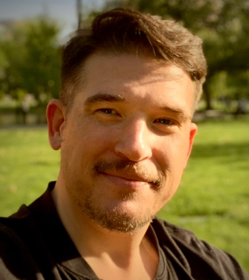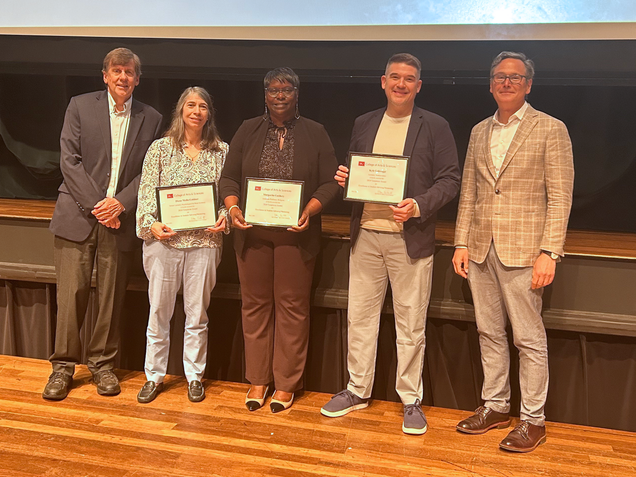The College of Arts & Sciences mourns the passing of Kyle Gobrogge, a behavioral neuroscientist and cherished lecturer in the Undergraduate Neuroscience Program, who died unexpectedly in early September, just before the start of the academic year.
 “Kyle was a beloved teacher, mentor, and friend,” said Mario Muscedere, director of the Undergraduate Program in Neuroscience. “Dr. G seemed to be every neuro major’s favorite teacher. He cared deeply about his students, both as students and as people, and celebrated their achievements every time our program got together.”
“Kyle was a beloved teacher, mentor, and friend,” said Mario Muscedere, director of the Undergraduate Program in Neuroscience. “Dr. G seemed to be every neuro major’s favorite teacher. He cared deeply about his students, both as students and as people, and celebrated their achievements every time our program got together.”
Known affectionately by students as “Dr. G,” Dr. Gobrogge joined Boston University in 2019 and was promoted to senior lecturer in July 2024. He directed the Principles of Neuroscience Laboratory, a project-based undergraduate space for inquiry-based neuroscience research, and in recognition of his exceptional mentorship, received the College’s Templeton Award for Excellence in Student Advising in 2024.
“He was just a genuine person, he really cared about everybody,” said John Tullai, a fellow senior lecturer in the Undergraduate Program in Neuroscience. “His teaching philosophy was to make sure that it was with every student, and it could be unique for every student, a collaboration. He made the environment what we were really all striving for.”
“Kyle’s kindness, empathy, and radically open teaching style left a mark on everyone he encountered,” added Kristen Bushell, also a fellow senior lecturer in the Undergraduate Program in Neuroscience. “He did enjoy the spotlight, but even more, he loved creating a spotlight for his students and his community.”
Dr. Gobrogge was deeply admired by students and colleagues alike for his warmth, generosity, and unwavering support. When he was nominated for the Templeton Award, students consistently praised his inclusive teaching style and commitment to their personal and academic growth.
One student wrote, “Dr. G genuinely cared for students’ mental health and valued my feelings. He provided me with valuable information about research opportunities, including UROP, and took the time to understand my interests and goals.” Another shared, “He never says no to writing a recommendation letter. He always listens intently and provides detailed and helpful feedback… Most importantly, he makes sure he is inclusive of everyone and always wants to make sure students are engaged and involved in their own learning.” A third student reflected, “Dr. G has inspired me to begin my own teaching career. I sincerely hope to make him proud one day and become an educator as impactful and kind as him.”

Dr. Gobrogge’s scientific career began at Michigan State University, where he studied the genetic and environmental influences on sex differences in behavior using human twin and rodent models. He earned an M.S. and Ph.D. in Neuroscience at Florida State University, conducting research on the neurobiology of aggression in prairie voles.
He went on to complete a prestigious NIH Ruth L. Kirschstein National Research Service Postdoctoral Fellowship at Harvard Medical School, where he investigated the behavioral effects of manipulating octopamine neurons in male fruit flies. His research continued at Tufts University and Boston College, where he used advanced opto- and chemo-genetic techniques to study stress and social behavior in rodents. In addition to Boston University, Dr. Gobrogge taught at Northeastern University. In 2008, he received the K. Patricia Cross Future Leaders Fellowship of the Association of American Colleges and Universities.
At Boston University, he was a key contributor to the Neuroscience Program curriculum, leading the design of the NE 203 Drosophila fruit fly lab, and creating many new courses, including NE/WS 456: “Neurobiology of Sex and Aggression,” one of the program’s most popular electives. His teaching philosophy was grounded in evidence-based, student-centered pedagogy. As he once wrote:
“We don’t just teach neuroscience—we engineer discovery. Students engage in real-world research, mastering the analytical tools and experimental frameworks that drive modern breakthroughs. This isn’t just learning; it’s hands-on innovation… Every student is a scientist the moment they ask the right question. Learning should be intrinsic, bold, and untethered from artificial constraints—a philosophy that propels my students to excel beyond the classroom, beyond the lab, and into the future.”
Dr. Gobrogge’s legacy will live on through the students he mentored, the courses he created, and the community he helped build.
“His mentorship, encouragement, and most of all his friendship shaped the person that I am and what I find most meaningful in life,” said Caroline Dugan (CAS`22), who was one of Gobrogge’s first students at BU, worked with him as a learning assistant and Neuroscience post-baccalaureate academic fellow, and is now a medical student at Albert Einstein College of Medicine. “It is not often that a person has such an impact on you that you can quite literally trace the ripple effects that they have on who you are and what you will become. I am so grateful for the goals he encouraged us to pursue and for his tireless advocacy for each and every one of our successes.”
“Dr. G made such a lasting impact on me, countless other students, and the Undergraduate Program in Neuroscience as a whole for years,” added Adanna Okoluku (CAS`26,), who served as an . “He shaped a part of my foundation as a neuroscientist, guiding, teaching, and nurturing my love for neuroscience. He gave his whole self to support the people around him and remains one of the kindest, attentive, warmest professor-scientists I have ever known… We move forward carrying our memories of him, holding each other close, and continuing the work and spirit he embodied, so he stays with us always.”
The Undergraduate Program in Neuroscience will be holding an afternoon of remembrance for Dr. Gobrogge on Thursday, September 18, 3–6 p.m. in KHC 101. Community members may drop in any time.